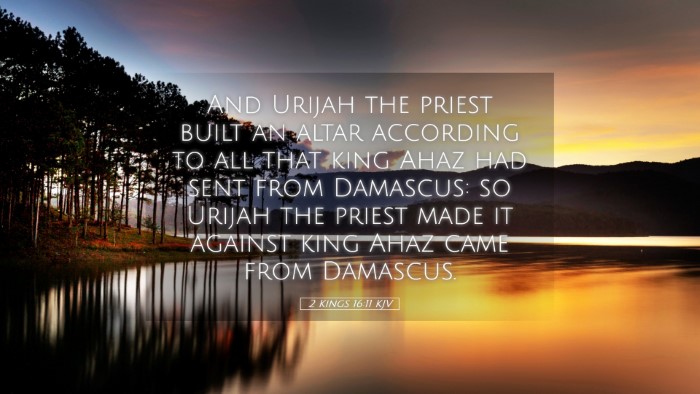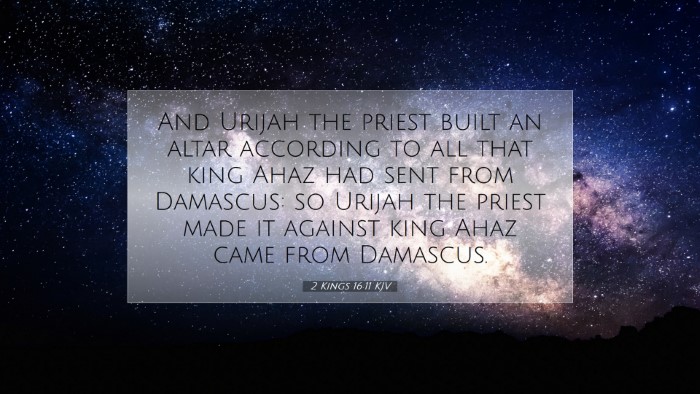Old Testament
Genesis Exodus Leviticus Numbers Deuteronomy Joshua Judges Ruth 1 Samuel 2 Samuel 1 Kings 2 Kings 1 Chronicles 2 Chronicles Ezra Nehemiah Esther Job Psalms Proverbs Ecclesiastes Song of Solomon Isaiah Jeremiah Lamentations Ezekiel Daniel Hosea Joel Amos Obadiah Jonah Micah Nahum Habakkuk Zephaniah Haggai Zechariah Malachi2 Kings 16:11
2 Kings 16:11 KJV
And Urijah the priest built an altar according to all that king Ahaz had sent from Damascus: so Urijah the priest made it against king Ahaz came from Damascus.
2 Kings 16:11 Bible Commentary
Commentary on 2 Kings 16:11
Verse Context: In 2 Kings 16:11, we find King Ahaz of Judah undertaking a significant act of idolatry and rebellion against the covenant of Yahweh. This verse highlights Ahaz's interaction with the Assyrian pagan practices and his subsequent actions regarding the altar.
Exegesis and Interpretation
This verse states: "And Urijah the priest did according to all that king Ahaz commanded." In examining this text, we can glean significant insights about the character and implications of Ahaz’s actions through the following commentaries:
Matthew Henry's Commentary
Matthew Henry emphasizes the disobedience of Ahaz in furthering the idolatrous practices that were rampant in Israel at the time. He notes that the actions of Ahaz reflect a broader moral decline within the leadership of Judah. In his analysis, Henry states:
"King Ahaz received orders from a pagan king, reflecting that he placed greater trust in earthly alliances than divine guidance. Urijah the priest seemingly complied with these commands, which illustrates how spiritual leaders can be complicit in apostasy if they do not adhere to God’s law."
Albert Barnes' Notes on the Bible
Albert Barnes offers a critical view of Urijah’s compliance with Ahaz’s directives, suggesting that he compromised his position as a priest:
"The action of Urijah signifies a departure from genuine worship, as he facilitated the king's disobedient agenda. This reveals the dangers of political power influencing spiritual practices, a paradigm that can lead to a corrupted worship framework."
Barnes additionally highlights the significance of the new altar constructed by Ahaz by stating that:
"This altar was a direct affront to the Mosaic law and God's established place of worship, essentially severing the community's connection to true worship under Yahweh."
Adam Clarke’s Commentary
In Adam Clarke's analysis, he discusses the ramifications of Urijah's actions in light of the wider theological implications:
"Urijah, instead of resisting the king’s unfaithfulness, bowed to his demands, leading to spiritual degradation within Judah. His complicity highlights the importance of the priestly office and the severe consequences when its holders fail to uphold their sacred responsibilities."
Clarke also draws attention to the idol worship that Ahaz endorsed:
"The act of adopting an altar that mirrored those of the Assyrians not only symbolized a theological shift but also highlighted the peril of syncretism within worship practices."
Theological Implications
The actions of Ahaz and the compliance of Urijah raise several crucial theological considerations for both individual believers and church leaders today:
- Authority and Compromise: The interplay between civil authority and spiritual allegiance is a recurring theme in biblical texts. Church leaders must reflect on where their loyalties lie when faced with pressures from secular powers.
- The Integrity of Worship: The need for pure worship practices that align with biblical teachings is critical. The narrative serves as a caution against adopting practices that dilute or contravene core beliefs.
- Judgment and Consequences: Ahaz’s sacrilegious acts had long-term effects for Judah, underscoring the notion that leaders are accountable for their actions (James 3:1). The narrative serves as a reminder of the consequences of national idolatry.
Application for Today
This passage challenges pastors, students, theologians, and scholars to evaluate the authenticity of their worship and the influence of the cultural context in which they operate:
- Evaluate Leadership: Leaders must be vigilant in maintaining the integrity of their teaching and practices against the tide of contemporary cultural pressure.
- Encourage Accountability: There should be a focus on fostering environments where church leaders are held accountable to biblical standards rather than worldly influences.
- Promote True Worship: Believers are encouraged to engage in worship that aligns with the scriptures, fostering a deeper relationship with God and upholding the sanctity of their faith.


